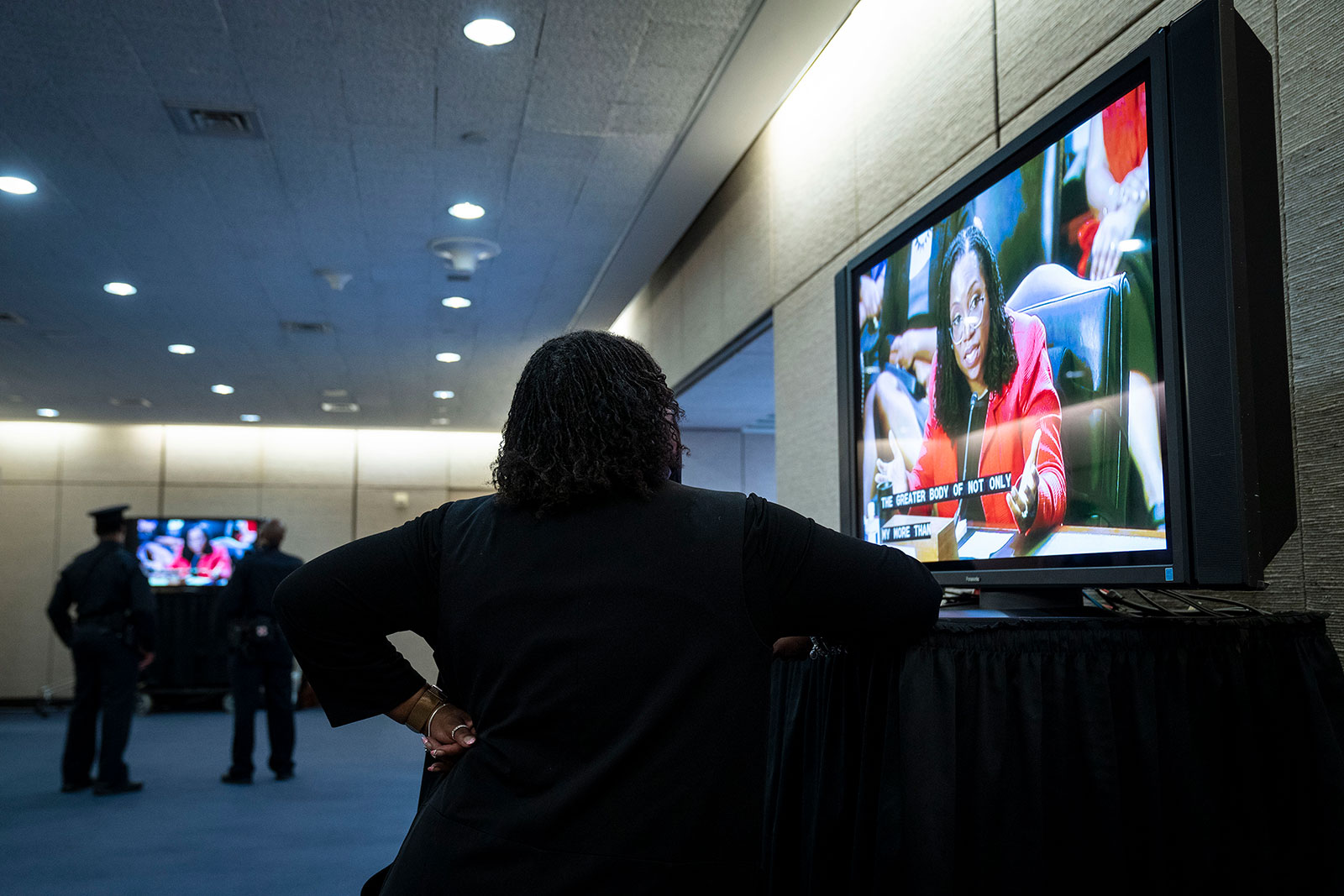 A woman watches a television on Capitol Hill that was streaming Jackson’s hearing on Tuesday. (Sarah Silbiger for CNN)
A woman watches a television on Capitol Hill that was streaming Jackson’s hearing on Tuesday. (Sarah Silbiger for CNN)The third day of Ketanji Brown Jackson‘s confirmation hearing is starting soon and Senate Judiciary Committee members will continue to question the Supreme Court nominee.
On Tuesday, Jackson’s first full day of questioning featured explanations of her approach as a judge, discussions of abstract legal concepts that can be pivotal in controversial Supreme Court cases, and her defense of a sentencing record that Republicans have claimed wasn’t adequately harsh on certain crimes.
Democrats gave Jackson plenty of opportunity to push back on the GOP attacks, while letting her discuss the background that will make her a unique addition to the Supreme Court.
Republicans, who on Monday vowed to take a high-minded tone in the proceedings, nonetheless grilled her on the issues that resonate with their culture war messaging ahead of this year’s midterms.
Here’s a look at some key takeaways from Tuesday’s session:
Jackson gives a view into how she approaches her job: Facing GOP skepticism for not aligning herself with a specific judicial philosophy, Jackson gave new details about the way she approaches her job and the “methodology” she uses for deciding a case.
“I am acutely aware that as a judge in our system I have limited power and I am trying in every case to stay in my lane,” she said.
The three-step process she described involved clearing her mind of any preconceived notions about the case, receiving the various inputs — the written briefs, the factual record, the hearings — she’ll need to decide a case, and embarking on an interpretation of the law that hews to “the constraints” on her role as a judge.
She said she was trying to “to figure out what the words mean as they were intended by the people who wrote them.”
Jackson pushes back on claims about her record on child porn cases: The judge finally had the chance on Tuesday to address what have been the most contentious allegations levied against her, telling the committee of claims she’s soft on child porn offenders that “nothing could be further from the truth.”
“These are some of the most difficult cases that a judge has to deal,” Jackson said when she was first given the chance by Judiciary Chairman Dick Durbin to respond to the claims, which were spearheaded last week by Missouri GOP Sen. Josh Hawley.
Later on in the hearing, she said she still has nightmares about the witness in one of the cases Republicans are now scrutinized, adding, “These crimes are, are horrible. And so I take them very seriously, just as I did all of the crimes, but especially crimes against children.”
Republicans have zeroed in on what they say is Jackson’s tendency to issue sentences in these cases that came below the sentencing guidelines — a pattern that puts her in the mainstream of judges. Less than a third of the sentences issued in non-production child pornography cases fell within the guidelines in 2019.
When she was being grilled by Texas Republican Sen. Ted Cruz, Jackson noted that the guidelines are just a starting point for judges.
GOP leans into culture war issues ahead of midterms: Broad culture war topics that Republicans are hitting Democrats on ahead of the midterms made their way into GOP questions for Jackson.
Cruz, for example, asked Jackson several questions about “critical race theory” — a concept that Jackson said “doesn’t come up in my work.”
“It’s never something that I have studied or relied on, and it wouldn’t be something that I would rely on if I was on the Supreme Court,” she said.
Cruz tried to connect it to Jackson through a presentation she made as vice chair of the US Sentencing Commission, in which Jackson said she listed it among a “laundry list of different academic disciplines that I said relate to sentencing policy.” He also raised it in the context of children’s books taught at Georgetown Day School, where Jackson is on the board. Jackson said that board does not control the school’s curriculum.
Abstract questions try to hint how she would approach controversial cases: GOP senators probed Jackson’s approach to abstract legal ideas that sound academic but that could be pivotal in how she’d decide controversial cases.
Cornyn raised the concept of “unenumerated rights” — meaning the rights not explicitly written in the Constitution’s text but that the court has interpreted to be covered by the Constitution’s protections.
Utah Sen. Mike Lee likewise focused some of his questioning on the 9th Amendment. Its language contemplates unenumerated rights, and he asked Jackson how judges should go about weighing what rights could flow from it.
Read more takeaways here and see photos from the confirmation hearings here.
